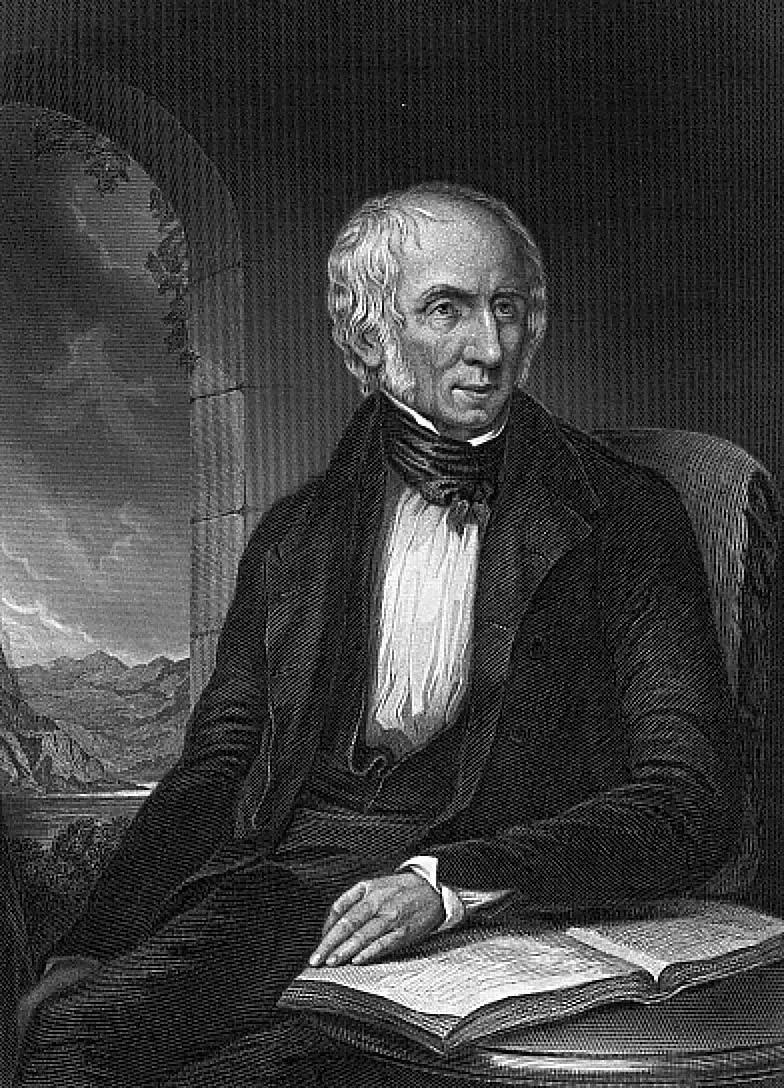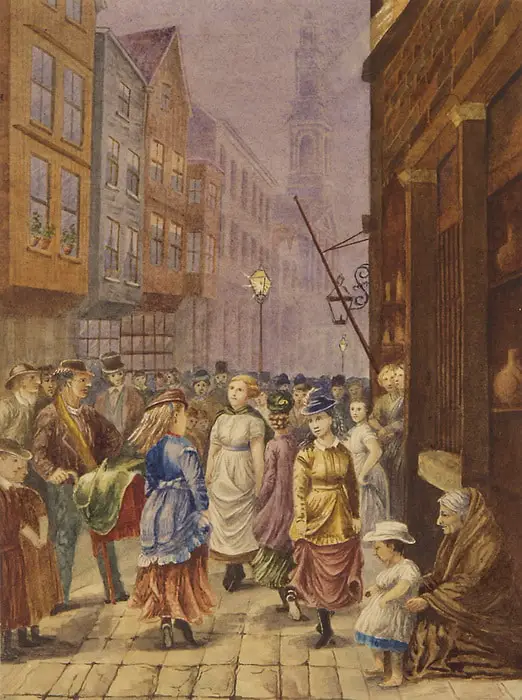
FULL POEM - SCROLL DOWN FOR LINE-BY-LINE ANALYSIS
Earth has not any thing to show more fair:
Dull would he be of soul who could pass by
A sight so touching in its majesty:
This City now doth, like a garment, wear
The beauty of the morning; silent, bare,
Ships, towers, domes, theatres, and temples lie
Open unto the fields, and to the sky;
All bright and glittering in the smokeless air.
Never did sun more beautifully steep
In his first splendour, valley, rock, or hill;
Ne’er saw I, never felt, a calm so deep!
The river glideth at his own sweet will:
Dear God! the very houses seem asleep;
And all that mighty heart is lying still!d

SUMMARY AND CONTEXT
Wordsworth’s ‘Composed upon Westminster Bridge, September 3, 1802’ is a Petrarchan Sonnet idolising the majesty of early-industrial London as viewed from Westminster Bridge on the morning of the 31st July 1802. A sonnet is a type of poem written in iambic pentameter and consisting of 14 lines. The Petrarchan variant is Italian and is divided into an octet (8 lines) followed by a sestet (6 lines). The octet typically introduces the theme of the poem, whist the sestet provides a resolution. In this sonnet, the octet introduces London’s grandeur through Wordsworth’s use of spectacular visual imagery; whilst the sestet expresses how this beauty impacts the speaker personally. The rhyme scheme is ABBAABBA, CDCDCD which, in conjunction with the rhythmic effect of iambic pentameter, gives the sonnet an elegant flow to mimic the elegance of the city itself. London was by no means exclusively idyllic like Wordsworth describes, with rampant poverty, pollution, overcrowding and disease plaguing the city streets amidst the early phases of the industrial revolution. Being a romantic poet, however, Wordsworth romanticises the city, choosing to capture it at its finest on a fine summer’s morning when its majesty dominated its imperfections.
LINE-BY-LINE ANALYSIS
STANZA 1
Earth has not any thing to show more fair:
The hyperbolic opening line is a statement so grand – designed to emulate the grandeur of the city itself as viewed from the eyes of Wordsworth, exclaiming that nothing else on Earth can match its beauty. Initially, the notion that a man-made entity can surpass the beauty of the natural world seems ridiculous – but Wordsworth’s use of spectacular visual imagery aims to justify just that in the following 13 lines.
Dull would he be of soul who could pass by
A sight so touching in its majesty:
Wordsworth goes as far as to say that a person able to pass by the view without stopping and admiring ‘its majesty’ would be ‘dull of soul’. Normal word order in this sentence is inverted, such that the adjective ‘dull’ precedes the verb and noun. This is anastrophe, which stresses the word ‘dull’, emphasising the just how dull such a person’s soul would have to be. Describing the vista as ‘touching in its majesty’ implies a spiritual connection between it and the beholder, illustrating its great impact.
This City now doth, like a garment, wear
The beauty of the morning; silent, bare,
This metaphor interestingly describes the city as wearing the morning ‘like a garment’. The donning of this beautiful attire brings out the beauty in both the city and the morning – they both complement each other so as to, together, create a ‘sight so touching in its majesty’. Akin to a beautiful woman wearing a beautiful dress.
Ships, towers, domes, theatres, and temples lie
This list encaptures the might of industrial London and each act as symbols for the great achievement and ingenuity of mankind in this era. The assembly of these great feats of engineering all within one portion of the city illustrates its prominence and the culmination of development and accomplishment present there.
Open unto the fields, and to the sky;
All bright and glittering in the smokeless air.
These two lines describe a harmonizing effect between the natural and man-made world, with the buildings in the city ‘glittering’ in the sunlight. From Wordsworth’s perspective, each entity is complementary, uniting to produce this dazzling optical image, which counteracts the traditional perception that the development of mankind tarnishes the beauty of the natural world.
Never did sun more beautifully steep
In his first splendour, valley, rock, or hill;
These two lines mark the beginning of the sestet which offers a resolution by elucidating the personal impact felt by Wordsworth upon observing ‘a sight so touching in its majesty’. Here, the sun is proclaimed to have never appeared so magnificent, even when shining on the natural phenomena of valleys, rocks, or hills. Note the personification of the sun, designed by Wordsworth to convey its true power and greatness – for which an indefinite pronoun like ‘it’ does not suffice.
Ne’er saw I, never felt, a calm so deep!
This line acts as the revelation where the reader learns the true extent of the emotional impact that the view has on the poet, with Wordsworth exclaiming that he had ‘never felt, a calm so deep!’ The hyperbole of this line makes it seem like the view has an almost hypnotic influence on him. Perhaps, Wordsworth so strongly romanticises the city in spite of its plethora of imperfections, because his trance-like state renders him oblivious to the latter.
The river glideth at his own sweet will:
The personification of the river (the Thames) and the imagery of it gliding at its own free will, connotes elegance and sophistication. The elegance of its flow is satisfying mirrored with the elegance of the rhythm of the iambic pentameter – as though the river itself flows at this very rhythm.
Dear God! the very houses seem asleep;
And all that mighty heart is lying still!
In the final two lines of the poem, Wordsworth reiterates the tranquillity of the environment on this fine summer’s morning, exclaiming that the ‘mighty heart [of the city] is lying still!’ The phrase ‘Dear God’ emphasises just how powerful an impact the view is having on him. Linking back to the third line, the view itself is reaching out and touching his soul, resulting in such a spiritual impact, that it almost feels divine or religious – prompting him to call out to God.


